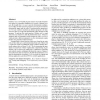Free Online Productivity Tools
i2Speak
i2Symbol
i2OCR
iTex2Img
iWeb2Print
iWeb2Shot
i2Type
iPdf2Split
iPdf2Merge
i2Bopomofo
i2Arabic
i2Style
i2Image
i2PDF
iLatex2Rtf
Sci2ools
109
Voted
PLDI
2012
ACM
2012
ACM
Chimera: hybrid program analysis for determinism
Chimera1 uses a new hybrid program analysis to provide deterministic replay for commodity multiprocessor systems. Chimera leverages the insight that it is easy to provide deterministic multiprocessor replay for data-race-free programs (one can just record nondeterministic inputs and the order of synchronization operations), so if we can somehow transform an arbitrary program to be datarace-free, then we can provide deterministic replay cheaply for that program. To perform this transformation, Chimera uses a sound static data-race detector to find all potential data-races. It then instruments pairs of potentially racing instructions with a weak-lock, which provides sufficient guarantees to allow deterministic replay but does not guarantee mutual exclusion. Unsurprisingly, a large fraction of data-races found by the static tool are false data-races, and instrumenting them each of them with a weak-lock results in prohibitively high overhead. Chimera dras
Arbitrary Program | Hybrid Program | PLDI 2012 | Programming Languages | Synchronization Operations |
Related Content
| Added | 27 Sep 2012 |
| Updated | 27 Sep 2012 |
| Type | Journal |
| Year | 2012 |
| Where | PLDI |
| Authors | Dongyoon Lee, Peter M. Chen, Jason Flinn, Satish Narayanasamy |
Comments (0)

